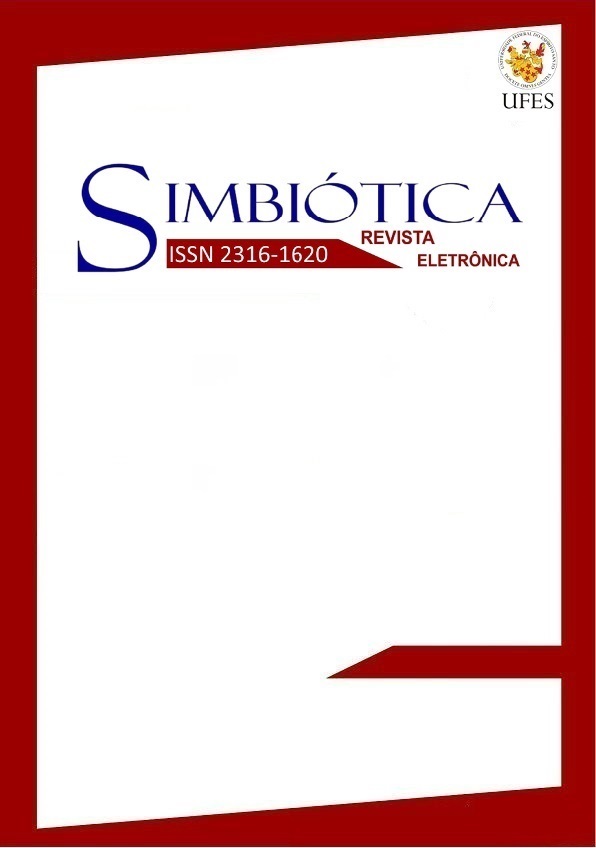O outro autor e a tarefa de escrever sobre si: as implicações subjetivas do contexto pós-colonial
DOI:
https://doi.org/10.47456/simbitica.v1i3.5492Resumo
A tarefa de escrever sobre si é sempre subjetiva, pois o indivíduo não vive isoladamente. Faz parte de um contexto histórico e geográfico, por isso sua reflexão trará dados da sociedade a qual ele está inserido. As confusões internas para a construção da narrativa do “eu”, com a multiplicidade de “eus” que convivem dentro do sujeito, se veem ainda mais complexas com a posição desse “eu” frente às situações das influências dos povos que constituíram a nação pós-colonial, principalmente das situações políticas das relações históricas entre esses povos. Assim, se configura o contexto pós-colonial da atualidade, em que a história foi conduzida pela centralidade de certos sujeitos em detrimento de outros, que foram marginalizados, subalternizados, e que só estiveram em destaque na condição de representados por outrem. Essa representação, dos que estavam postos às margens, do considerado Outro, era realizada sem a voz ativa do sujeito na construção de sua própria representação. Além disso, esse Outro, aqui retratado como o ser negro, foi impelido a seguir o padrão cultural e imagético do que era posto como o universal, isto é, o branco europeu. Esse ambiente influenciou no desenvolvimento das identidades e na posição política adotada desse Outro, ocasionando em novas subjetividades e possibilidades de diálogos entre povos que passaram pela condição histórica de colonização, no caso o Brasil e o continente africano. Assim, a autobiografia do Outro acaba por trazer elementos do grupo o qual ele está integrado e que vive sob a mesma condição de marginalizado. Portanto, essa autobiografia é uma importante ferramenta para compreensão desse Outro, agora numa situação diferente, na recuperação da condição de sujeito de sua própria representação. Ocasionando, então, numa subjetividade da escrita que explora novos sentidos e traz novas interpretações para a compreensão da realidade pós-colonial.
Abstract: The task of writing about a reflexive analysis of yourself is always subjective, because the individual does not live in isolation. He is part of a historical and geographical context, so data will reflect the society in which he is inserted. The internal confusion for the construction of the narrative "I", with the multiplicity of "selves" who live within the subject, find themselves even more complex with the position that "I" face the situations of the influences of people who formed the nation post -colonial, mainly political situations of the historical relations between these peoples. So if configures the post-colonial context of today, in which the story was driven by the centrality of certain individuals over others, who were marginalized, subordinate, and which were only highlighted in condition represented by others. This representation of the banks that were set, considered the Other, was conducted without the subject's voice in building its own representation. Moreover, this Other, here portrayed as being black, was compelled to follow the cultural pattern and imagery than was posited as the universal, that is, the white European. This environment influenced the development of identities and political position adopted this Other, resulting in new subjectivities and possibilities of dialogue between people who have gone through historical condition of colonization, where Brazil and Africa. Thus, the autobiography of the Other ultimately bring elements of the group which it is integrated, living under the same condition marginalized. Therefore, this autobiography is an important tool for understanding this Other, a different situation now, recovering a subject of its own representation. Causing then a subjectivity of writing that explores new directions and brings new insights to the understanding of post-colonial reality.
Downloads
Downloads
Publicado
Como Citar
Edição
Seção
Licença
Copyright (c) 2020 Katia Gomes da Silva

Este trabalho está licenciado sob uma licença Creative Commons Attribution-NonCommercial-NoDerivatives 4.0 International License.
Autores que publicam nesta revista concordam com os seguintes termos:
a. Autores mantém os direitos autorais e concedem à revista o direito de primeira publicação, com o trabalho simultaneamente licenciado sob a Creative Commons - Atribuição-NãoComercial 4.0 Internacional.
b. Compartilhar - copiar e distribuir o material em qualquer meio ou formato.
Adaptar - remix, transformar e construir sobre o material para qualquer finalidade, inclusive comercial.
c. Autores têm autorização para assumir contratos adicionais separadamente, para distribuição não-exclusiva da versão do trabalho publicada nesta revista (ex.: publicar em repositório institucional ou como capítulo de livro), com reconhecimento de autoria e publicação inicial nesta revista.
d. Autores têm permissão e são estimulados a publicar e distribuir seu trabalho online (ex.: em repositórios institucionais ou na sua página pessoal) a qualquer ponto antes ou durante o processo editorial, já que isso pode gerar alterações produtivas, bem como aumentar o impacto e a citação do trabalho publicado (Veja O Efeito do Acesso Livre).
Authors who publish in this journal agree to the following terms:
a. Authors retain the copyright and grant the magazine the right of first publication, with work simultaneously licensed under the CCreative Commons - Atribuição-NãoComercial 4.0 Internacional.
b. Share - copy and distribute the material in any medium or format.
Adapt - remix, transform and build on the material for any purpose, including commercial.
c. Authors are authorized to take additional contracts separately, for non-exclusive distribution of the version of the work published in this journal (eg, publish in institutional repository or as a book chapter), with acknowledgment of authorship and initial publication in this journal.
d. Authors are allowed and encouraged to publish and distribute their work online (eg.: in institutional repositories or on their personal page) at any point before or during the editorial process, as this can generate productive changes as well as increase the impact and the citation of the published work (See The Effect of Free Access).












